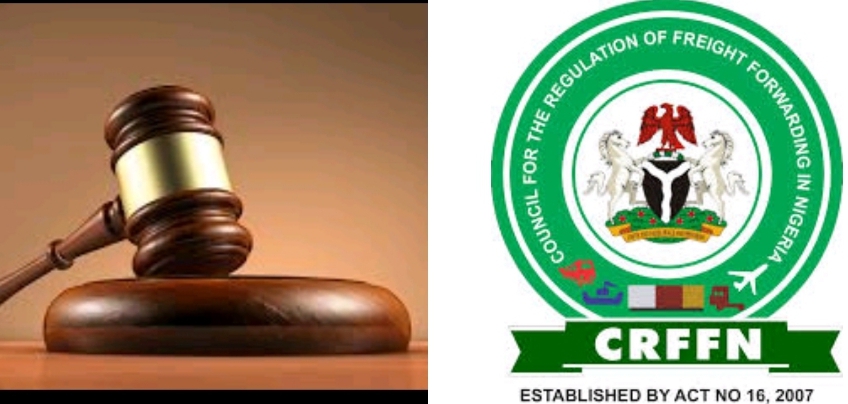CRFFN Collecting POF From Customs Agents Illegal, Court Declares
...Says Customs is Regulator of Agents

A Federal High Court in Lagos has declared that the collection of Practitioners Operating Fee(POF) by the Council for the Regulation of Freight Forwarding in Nigeria (CRFFN) from Licensed Customs Agents is illegal
A copy of the judgement in Suit No. FHC/CS/765/2018 filled by the National Council of Managing Directors of Licensed Customs Agents (NCMDLCA) recently obtained by our reporter, also stated that licensed customs agents are not under the regulation of the CRFFN
Justice D.E.Osiagor in the ruling against the Honorable Minister of Transportation, the Nigerian Ports Authority and the CRFFN declared that collecting the collection of Practitioners’ Operating Fee (POF) from Licenced Customs Agents is illegal while agreeing with the plaintiff that a freight forwader is different from a licensed customs agent.
Justice Isiagor said that “the regulation of licensed customs agents is governed squarely by the Customs and Excise Management Act which provides a comprehensive legal framework for the licensing and oversight of customs operations in Nigeria specifically”
He added that “the regulatory reach of CRFFN does not extend to customs agents licensed under CEMA. Therefore, any attempt to subject licensed customs agents to CRFFN regulation including the payment of POF lacks legal foundation”
The judgment, delivered on Monday, May 26, 2025, effectively nullifies the directive issued by the Ministry of Transportation mandating that Licensed Customs Agents (LCAs) to obtain clearance from the CRFFN including payment of registration fees, subscription dues, and Practitioners Operating Fees (POF) as a precondition for access to ports and renewal of operational licenses.
According to the court, the regulation of Licensed Customs Agents falls squarely under the Customs and Excise Management Act (CEMA), which vests authority solely in the Minister of Finance and the Nigeria Customs Service (NCS). The court found that the Minister of Transportation, acting through the NPA and CRFFN, had overstepped legal boundaries by attempting to impose regulatory and financial obligations on a profession it has no statutory control over.
The court was absolute in its ruling stating that “Only the Minister of Finance, acting through the Nigeria Customs Service, is statutorily authorized to regulate the business and operation of Licensed Customs Agents.” Section 2 of CEMA explicitly defines “Minister” as referring to the Minister of Finance, while Sections 153 and 156 detail the licensing, oversight, and fee structures for LCAs. Nowhere in the Act is the Ministry of Transportation empowered to interfere in the regulatory affairs of customs agents.
The judgment reinforced that LCAs are a distinct professional body from freight forwarders, who are the sole concern of the CRFFN. The court noted that the CRFFN Act of 2007 was established to regulate freight forwarders and cannot be applied to customs agents without breaching statutory and constitutional safeguards. As such, any overlap in practice or port access does not justify regulatory conflation.
Central to the suit was the controversial directive, first published in the Vanguard newspaper on August 1, 2017, which required LCAs to comply with CRFFN clearance procedures and pay associated fees for access to port facilities. The court ruled that this directive not only lacked legal foundation but also imposed an “unauthorized and unlawful financial imposition” that had no backing under CEMA.
The judgment further held that the directive created serious regulatory confusion and jeopardy for LCAs, subjecting them to dual and conflicting obligations, and placing their businesses and constitutional rights at risk. By conditioning port access and license renewal on compliance with CRFFN regulations, the directive effectively undermined the LCAs’ ability to carry out their statutory duties, amounting to what the court described as “constructive exclusion from lawful business.”
The court also dismissed arguments suggesting that the plaintiffs had consented to the directive by attending stakeholder meetings. It ruled that mere attendance did not amount to legal acquiescence, especially since estoppel cannot operate to validate an act that is fundamentally ultra vires and unlawful.
Consequently, the court granted all declaratory and consequential reliefs sought by the NCMDLCA, including the setting aside of the Ministerial directive and affirming the right of LCAs to access ports and operate freely based solely on valid licenses issued under CEMA. In its final orders, the court declared that , The Ministry of Transportation lacks the legal authority to regulate Licensed Customs Agents, the directive mandating compliance with CRFFN requirements is ultra vires, null, and void, Licensed Customs Agents shall not be subjected to regulation or fee payment to CRFFN for port access or license renewal and any such administrative action contravenes statutory and constitutional rights and must be struck down.
An inquiry by JournalNG reporter over the mention of the repealed CEMA which has been replaced by Nigeria Customs Service Act(NCSA) 2023 further validates the judgement as legal sources disclosed that the powers of NCS licensing it’s agents subsist in the new Act
They also added that the creation of a Federal Ministry of Marine and Blue Economy from the old Ministry of Transportation does not affect the judgement despite the CRFFN movement from the latter to the former
The judgment represents a legal victory for the NCMDLCA and reaffirms the supremacy of statutory law over administrative overreach.












Great article! Thinking about trying online casinos, and seeing platforms like jiliboss casino really highlights how far tech has come. Easy app downloads are a plus too! 🤔 Seems user-friendly for beginners.
tj2qyh